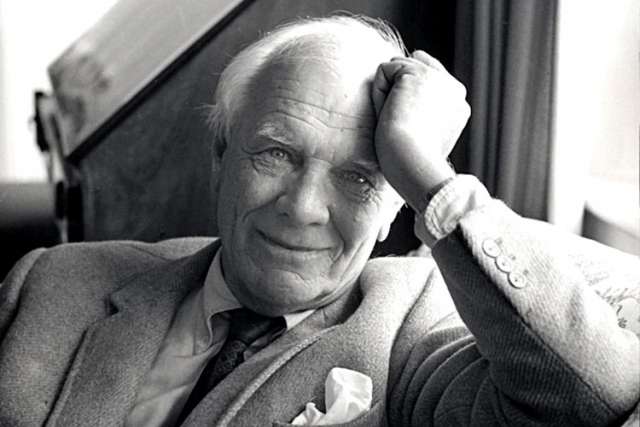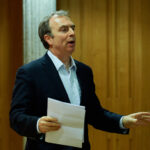Blog Post
Why Malcolm Muggeridge believed abortion could destroy the West
By Jonathon Van Maren
When Malcolm Muggeridge passed away on November 14, 1990, he was the best-known defender of the Christian faith in the West. As a writer, TV personality, and public intellectual, Muggeridge had exposed the Holodomor of Stalin’s Soviet Union after Communism soured him on his personal political utopianism; had worked undercover with MI-6 during the war; and had met, interviewed, or befriended nearly every important personage of his time. Despite all that, Malcolm Muggeridge took the time to defend the pro-life cause whenever the opportunity presented itself.
Many veterans of the Canadian pro-life movement remember the Muggeridges as comrades during the early days of the fight against abortion. Malcolm’s son John Muggeridge and his wife Anne Roche, who lived in Toronto, were supporters of the movement, and two of Malcolm’s grandsons, Peter and Charles, wrote for the pro-life newspaper The Interim. John was an editorial advisor to LifeSiteNews, a senior editor of the New York-based Human Life Review, and a friend of writers such as George Jonas and Peter Worthington. Kitty Muggeridge, a brilliant writer in her own right, lived in Welland, Ontario with her son and daughter-in-law after Malcolm died until her own death in June 1994.
Paul Broughton of Life Cycle Books told me that Malcolm Muggeridge toured around Southern Ontario during the 1970s, giving lectures night after night to packed-out theaters on the sanctity of life and the threat of abortion. Broughton attended several of these lectures—people were grateful for the opportunity to hear one of the world’s greatest living journalists speak on an issue dear to their hearts. The second Festival for Life in Ottawa in 1977 featured Muggeridge as a keynote speaker; he also visited St. Catharine’s Right to Life in October 1978, speaking on “The Slippery Slope” at the Thistle Theatre at Brock University, discussing the slide from contraception to abortion on demand.
Muggeridge’s unparalleled memoirs Chronicles of Wasted Time as well as The Third Testament and his other tomes are well-known; less remembered are his writings on abortion. Muggeridge (along with Everett C. Koop) wrote one of the afterwords to President Ronald Reagan’s slim 1984 book Abortion and the Conscience of a Nation. He often condemned abortion on TV and in print, but perhaps the most succinct summary of his views—still so applicable to today—was first published in the early 1970s in the London Sunday Times, and reprinted in 1975 in the Human Life Review:
Our Western way of life has come to a parting of the ways; time’s takeover bid for eternity has reached the point at which irrevocable decisions have to be taken. Either we go on with the process of shaping our own destiny without reference to any higher being than Man, deciding ourselves how many children shall be born, when and in what varieties, which lives are worth continuing and which should be put out, from whom spare-parts-kidneys, hearts, genitals, brainboxes even-shall be taken and to whom allotted.
Or we draw back, seeking to understand and fall in with our Creator’s purpose for us rather than to pursue our own; in true humility praying, as the founder of our religion and our civilization taught us: Thy will be done.
This is what the abortion controversy is about, and what the euthanasia controversy will be about when, as must inevitably happen soon, it arises. The logical sequel to the destruction of what are called “unwanted children” will be the elimination of what will be called “unwanted lives”—a legislative measure which so far in all human history only the Nazi Government has ventured to enact.
In this sense the abortion controversy is the most vital and relevant of all. For we can survive energy crises, inflation, wars, revolutions and insurrections, as they have been survived in the past; but if we transgress against the very basis of our mortal existence, becoming our own gods in our own universe, then we shall surely and deservedly perish from the earth.
Muggeridge was one of those prophets cursed to see many of the tragedies he warned of come to pass, and his condemnation of the sexual revolution unfolding across the West was made only keener by his own experience as a promiscuous and adulterous young man. He knew the toll such destructive behaviors have on marriages, families, and souls, and he made many of his contemporaries profoundly uncomfortable with his soul-searching writings on life, death, and the murder of the pre-born. His biographer Gregory Wolfe recently told me that this is one reason that Muggeridge is less prominent than many of the other great Christian English writers such as C.S. Lewis or G.K. Chesterton—although he is easily their literary equal.
Despite this, Muggeridge entered old age with optimism. “We can watch the institutions and social structures of our time collapse—and I think you who are young are fated to watch them collapse—and we can reckon with what seems like an irresistibly growing power of materialism and materialist societies,” he wrote. “But, it will not happen that that is the end of the story. As St. Augustine said—and I love to think of it when he received the news in Carthage that Rome had been sacked: Well, if that’s happened it’s a great catastrophe, but we must never forget that the earthly cities that men build they destroy, but there is also the City of God which men didn’t build and can’t destroy. And he devoted the next seventeen years of his life to working out the relationship between the earthly city and the City of God—the earthly city where we live for a short time, and the City of God whose citizens we are for all eternity.”
Malcolm Muggeridge understood not only the battle, but the war. His writings deserve to be remembered, read, and re-read for that very reason.
***
If any of you are interested, this is a great documentary on Malcolm Muggeridge:









Very wise and very under-rated man.